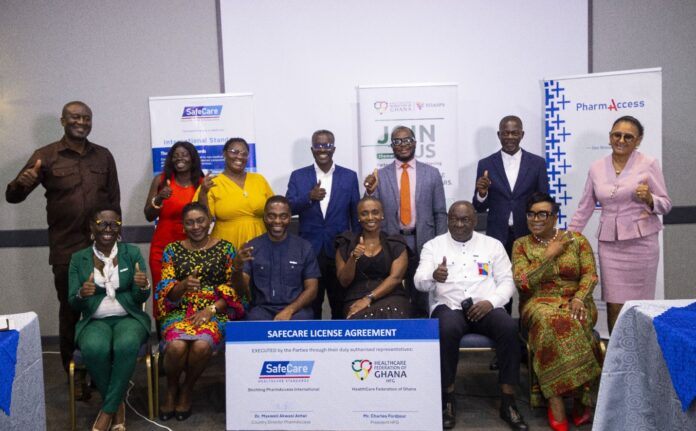In a landmark development poised to reshape private healthcare delivery in Ghana, PharmAccess and the Healthcare Federation of Ghana (HFG) have officially signed a licensing agreement that grants HFG access to the globally recognised SafeCare Quality Improvement Programme.
HFG will be among the first to utilize the International Society for Quality in Healthcare (ISQua) accredited SafeCare standards, version 5, the latest version.
The agreement, signed in Accra, marks a renewed commitment to delivering high-quality healthcare across the private sector, utilizing internationally recognized benchmarks and digital tools. It represents the final piece in a broader strategy that has already seen SafeCare embedded within Ghana’s faith-based and public sectors.
Speaking at the signing ceremony in Accra, Country Director of PharmAccess Ghana, Dr. Maxwell Antwi, said the agreement is a bold initiative to transform private sector healthcare in the country.
“PharmAccess is a development organisation that has, for over two decades, focused on unlocking the power of connectivity and data to strengthen inclusive health markets – so more people can access better healthcare, lead healthier lives, and reach their full potential. SafeCare, a sister foundation, is central to that mission.”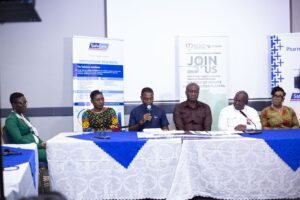
According to Dr. Antwi, SafeCare is currently operational in 27 countries and works with 34 partners, impacting over 9,500 healthcare facilities. It has conducted more than 8,500 digital quality assessments using ISQua-accredited standards and has trained nearly 1,000 internationally certified assessors.
“Over 70% of facilities that use the SafeCare approach show measurable improvements in quality, and these facilities together serve nearly 100 million patients annually,” Dr. Antwi revealed.
He added that earlier this year, Ghana’s Ministry of Health formally adopted SafeCare as a national quality standard – a move he described as a “watershed moment” for quality assurance in the country. The Health Facilities Regulatory Agency (HeFRA) has also recognised SafeCare as an accreditation benchmark.
Highlighting the urgency of prioritising quality, Dr. Antwi cited World Health Organisation (WHO) statistics showing that between 5.7 and 8.4 million deaths occur annually in low- and middle-income countries due to poor-quality healthcare – more than from lack of access.
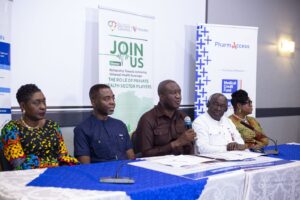
“Poor quality care kills twice as many people annually as COVID-19 did at its peak,” he warned. “And 60% of deaths from treatable conditions occur in facilities where patients already sought care. These are facilities failing not because people didn’t arrive – but because their care was ineffective.”
He further added that healthcare providers must recognise quality not just as an ethical obligation but as a strategic imperative. It builds patient trust, increases utilization, reduces errors and costs, and opens access to finance and investment. It also gives facilities a competitive edge in an increasingly transparent, data-driven healthcare environment.

Also speaking at the event, the President of the Healthcare Federation of Ghana, Mr. Charles Fordjour, praised the partnership as a breakthrough for private healthcare providers.
“Today is a very important day in the annals of what we aim to achieve for our country, Ghana,” he declared. “Healthcare is wealth—and it will drive our economy. We are committed to ensuring every Ghanaian has access to quality healthcare,” he said.
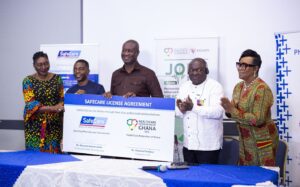
Mr. Fordjour noted that over 70% of Ghana’s healthcare facilities fall within the private sector, and more than 60% of Ghanaians use private healthcare services. The partnership, he explained, would empower HFG to train assessors and certify member facilities to meet global standards using SafeCare Version 5.
He added, “This agreement allows us to say, with confidence, that our services meet global benchmarks. Wherever you see the SafeCare logo, it means that the facility delivers healthcare comparable to the best in the world.”
He emphasised that this development could stem the tide of outbound medical tourism and, instead, position Ghana as a destination for high-quality healthcare within West Africa and beyond.
“This is a game-changer and we will ensure that all stakeholders – private insurers, corporate HR directors and the Ghanaian public – recognise SafeCare accreditation as a mark of guaranteed care,” he stressed.
Also gracing the occasion was the President-Elect of the West African Federation of Private Health Sector (FOASPS), Dr. Linda Deka, who described the signing agreement as deeply personal and profoundly important.
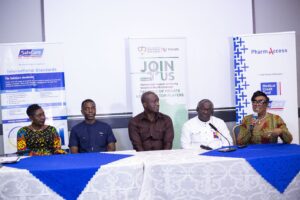
“We all know that quality doesn’t come cheap. Often, clients don’t see the value immediately, but eventually, they feel it, and it translates into higher trust, loyalty, and improved outcomes,” she indicated.
Dr. Deka expressed optimism that SafeCare could be expanded beyond Ghana into at least two or three more West African countries within the next two years.
Adding a provider’s perspective, the CEO of FOCOS Orthopaedic Hospital, Dr. Irene Adorkor Wulff, expressed strong support for the SafeCare initiative.
She emphasised that healthcare providers needed to recognise that quality was not merely an ethical obligation but a strategic imperative. According to her, quality helped build patient trust, increased utilisation, reduced errors and costs, and opened access to finance and investment.
She also noted that quality gives facilities a competitive advantage in an increasingly transparent and data-driven healthcare environment.

“From our founding in 2011, quality has been our hallmark. We’re outcomes-oriented and patients who come in for treatment return not because their problems weren’t solved, but because they trust us,” she said.
The FOCOS Orthopaedic Hospital, she revealed, is currently undergoing preparations for Joint Commission International (JCI) accreditation – an ambitious goal that places it among the most quality-focused institutions in the country.
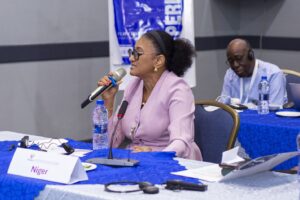
“It’s not easy. That’s why many shy away from it. It requires real investment. You have to put the right processes, standards, and SOPs in place. You have to train staff to know and follow these protocols. It’s not like in Ghana, where we often say. There’s a law for everything, but no law at all. That doesn’t work in healthcare. After you establish the policies, the staff must be trained to implement them.”
“Yes, it’s expensive. You might need to upgrade infrastructure, change layouts, or add facilities. But it’s an investment – and a worthwhile one. Once you’ve done it and get to where we are today, patients say, I’m not going anywhere else. They know we might be slightly more expensive, but they stay because nobody treats them the way we do. We give them exactly what they want, how they want it. That is quality healthcare,” she added.
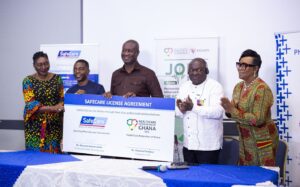
Country Director for SafeCare at PharmAccess Ghana, Ms. Bonafasia Agyei, called the licensing agreement a historic milestone that closes the triangle of quality integration across Ghana’s health system.
“We’ve worked for years with CHAG in the faith-based sector. We’re collaborating closely with the Ghana Health Service in the public sector. What remained was the private sector. Today, with HFG on board, we’ve completed the puzzle,” she said.

Ms. Agyei emphasised that SafeCare is not just about clinical performance, but overall efficiency, business performance, patient handling, and operational risk reduction.
The SafeCare Ghana Director indicated that “In just two years, SafeCare improves facility efficiency and makes them more attractive to investors. This is an opportunity to grow businesses, improve patient experience, and strengthen Ghana’s health system.”
Looking ahead, she outlined plans to train healthcare professionals from the Federation to become certified assessors. These professionals will lead assessments and guide facilities through a digitally enabled cycle of continuous quality improvement.
The ceremony was attended by several high-level dignitaries, including the President of FOASPS, Dr. Joseph Boguifo, President-Elect, FOASPS, Dr. Linda Deka, as well as Country Director, PharmAccess Nigeria, and President of Healthcare Federation of Nigeria, Njide Ndili.
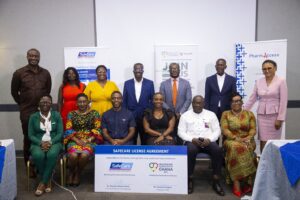
As the Healthcare Federation of Ghana takes this bold step toward institutionalising quality across its healthcare system, the SafeCare license agreement stands as a transformative milestone. With the private sector now aligned alongside public and faith-based institutions under a unified quality framework, the country is poised to set a new benchmark for healthcare delivery in West Africa.

